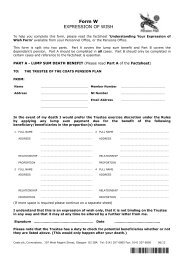Microsoft Word -Potted history of Coats plc - Coats Pension Plan
Microsoft Word -Potted history of Coats plc - Coats Pension Plan
Microsoft Word -Potted history of Coats plc - Coats Pension Plan
You also want an ePaper? Increase the reach of your titles
YUMPU automatically turns print PDFs into web optimized ePapers that Google loves.
Djanogly <strong>of</strong> Nottingham Manufacturing. The company was as cash-rich as Carrington<br />
Viyella had been debt-laden and brought with it strong links with the retailer Marks &<br />
Spencer, to whom Nottingham Manufacturers supplied hosiery and knitwear. This<br />
acquisition bolstered the group prior to the climactic merger in the following year<br />
with <strong>Coats</strong> Patons <strong>plc</strong>.<br />
<strong>Coats</strong> Patons was itself the result <strong>of</strong> a 1960 merger between J & P <strong>Coats</strong> Ltd. and<br />
Patons & Baldwins Ltd. J & P <strong>Coats</strong> had its origins in Paisley, near Glasgow,<br />
commencing thread manufacture in 1825. The business was especially successful in<br />
the North American market, and its growth culminated in a highly successful public<br />
<strong>of</strong>fering in 1890. By the turn <strong>of</strong> the century, by amalgamation with other thread<br />
producers--including its Paisley rivals, Clark & Company--<strong>Coats</strong> had become the<br />
largest textile firm in Britain, with factories worldwide.<br />
Patons & Baldwins derived from two separate concerns--JJ Baldwin & Partners Ltd.,<br />
established at Halifax in 1785, and John Paton, Son & Company Ltd. <strong>of</strong> Alloa,<br />
established 1813, that merged in 1920. The merged company was a woolen and<br />
worsted spinner, specializing in knitting wools, with factories throughout Britain, as<br />
well as in Canada, China, and Tasmania.<br />
Early in 1986, <strong>Coats</strong> Patons was the subject <strong>of</strong> an agreed takeover bid by a knitwear<br />
group, Dawson International <strong>plc</strong>. <strong>Coats</strong> had already been identified as a possible longterm<br />
target for Vantona Viyella but the proposed Dawson deal precipitated action by<br />
them. Dawson was successfully outbid by an <strong>of</strong>fer worth £715 million. In March<br />
1986, Vantona, like Spirella before it, was dropped from the company's name that<br />
then reflected its largest components in its new name, <strong>Coats</strong> Viyella <strong>plc</strong>.<br />
By 1989, it began to look as if another famous name would have to be<br />
accommodated. Tootal Group <strong>plc</strong> was the descendant <strong>of</strong> the English Sewing Cotton<br />
Company Ltd., incorporated 1897, a sewing thread and yarn producer whose Sylko<br />
domestic sewing thread became a household name. As part <strong>of</strong> the trend towards larger<br />
groupings in the textile industry, English Sewing Cotton expanded, acquiring the<br />
Manchester-based business <strong>of</strong> Tootal Broadhurst Lee & Company Ltd., incorporated<br />
1888, in 1963. Five years later, the company changed its name to English Calico Ltd.<br />
following the acquisition <strong>of</strong> the Calico Printers Association Ltd. The change <strong>of</strong> name<br />
was short-lived, and in 1973 the company became Tootal Ltd.<br />
Although one <strong>of</strong> the "big four" <strong>of</strong> British textile firms, Tootal's disappointing<br />
performance during the 1980s had left it vulnerable to a takeover bid. This duly<br />
emerged in the shape <strong>of</strong> Australian entrepreneur Abe Goldberg, who acquired a<br />
29.9% stake in the company. When he was rebuffed by the Tootal board, <strong>Coats</strong><br />
Viyella stepped in to acquire Goldberg's shareholding and to agree to terms for a £395<br />
million takeover. The bid lapsed, however, after it was referred to the Monopolies and<br />
Mergers Commission (MMC).<br />
Prospects revived after the MMC recommended that <strong>Coats</strong> divest itself <strong>of</strong> its U.K. and<br />
German sewing thread businesses, a condition with which it was relatively easy to<br />
comply. However, when it became clear that <strong>Coats</strong> was to renew its <strong>of</strong>fer at a much<br />
lower valuation, Tootal's resistance grew. Reluctance to be taken over on the cheap,<br />
as they saw it, was accompanied by references to differing management cultures by



